Imperium Romanum
Cat: HIS
Pub: 2000
#: 1619b
Nanami Shiono (塩野七生)
16020u/18227r
Résume
Remarks
>Top 0. Preface:
- 'Salve, intrate possum?' (Hellow, can I enter?)
- The impression of house differs very much, when one enters into an ancient Roman house (Domus; Villa) from the front door to the wellhole room, or from side door directly to patio?
- It could be more vivid to describe the ancient Rome, people and their life style, in more informal way of approach, just line entering their living space from side door.
0. 序文:
- Salveとは、Ciaoより少し知的な挨拶
- 古代ローマ帝国市民の家 (Domus, Villa)を訪問するとしたら、正面玄関からより裏の入口から中庭へ入る方がよい。
- 個人のライフスタイルを覗くような感覚で当時の時代を理解する。
>Top 1. Was the Rome conquered culturally by the Greece?:
- About 300 years 3C BC - 1C AD), private tutors of the children of the Senate Class of the Roman Empire were mostly Greeks.
- This trend had been unchanged since 2C BC, when Greece was completely colonized by the Rome.
- The Greeks taught the Romans was philosophy, logic, history, and mathematics by then lingua franca Greek.
- The Greek had accomplished in the degree of completion of language than Latin; backed by superior cultural works by the Greeks.
- The military winner Rome adopted to learn from culture from loser Greek.
- By around 1C BC, the Rome attained no less level of Greek culture, such as Terentius and Plautus of drama, Catullus of poem, Ciero and Caesar of prose.
- Maturity of language means that the language has enough grammar and vocabulary enabling to express complex and delicate expression of thought and feeling.
- The Romans since middle of 1C BC had attained such level of culture. But the Romans never enforced the Greek to use Latin instead of Greek, because of:
- It was effective for Romans to understand the essence of Greek works in Greek language.
- The Hellenistic world covered not only politics and culture but also navigation and trade know-how in Greek language.
- Upper class of the Romans were bilingual; Latin and Greek.
- The Roman Empire proved to be an comprehensive kingdom comprising multi tribes, multi religions, and multi cultures.
- The most excellent feature of the Roma was not to do everything by the Roman; i.e., focussing mainly politics, military, and construction infrastructure by themselves, and trusting the ruled people to engage the other things.
- Pax Romana was attained not only by conquering the external enemies, but by trying to exclude enemy from the internal people.
- Polybius (c204-c125 BC), a famous Greek history, wrote the history of Rome, and Publio Terenzio (c190-c159 BC) Afro born in Carthage and brought as a slave to Rome became an excellent comic writer in Latin culture.
- Gaius Julius Caesar (100-44 BC) said, "The Romans have no arrogance to reject to learn from other tribes. If it were good, they had chosen to imitate them."
- >Top Graecia capta ferum victorem cepit. (Captive Greece conquered her savage victor. (Horace, Horatius 65-8 BC)
- Augustus, Emperor (63BC - 14AD) had two supporters:
- Marcus Agrippa (63-12BC); military advisor
- Gaius Maecenas (70BC-8AD); political advisor (>mécénat)
- Publius Vergilius (70-19 BC), poet and Quintus Horatius (65-8 BC), poet gained the Emperor's confidence.
1. ローマは文化的にはギリシアに征服されたのか?:
- BC 3Cの約300年間、ローマ帝国元老院階級の師弟の教育者はほとんどギリシア人
- しかし1C BC頃にはローマの文化はギリシアに追いついた。
- ローマの特徴は何でもローマ人で行おうとせず、特に政治・軍事・建築以外では、他民族を活用した。
- Pax Romanaは、外部の敵を征服しただけでなく、内部の被征服者が敵に回らないようにしたこと。
- ローマの上流階級はラテン語とギリシア語のバイリンガルであった。
- アウグスティヌス帝の2人の補佐がいた。
- 軍事面: アグリッパ
- 政治面: マエケナス
- ローマ人の優れた資質として、すべてをローマ人だけでやろうとしなっかたこと。
- 政治・軍事・経済政策・インフラ整備以外は、全て被支配者
- 文化的にはギリシア人の優位性を容認。
- 'Graecia capta ferum vitorem cepit.' 文化ではギリシアに征服された。(Horatius)
>Top 2. What about the evils of conduct of the Romans?:
- Historical books point the cause of the Roman Empires was the total assessment of such evils of conduct as war, preference for spectacle, avarice, gastronomy, waste, depravity, bribery, hedonism, decadence, violence, murder, divorce, etc.
- Is there any basis or reasons of such analysis?
- Had the mural painting of brothels in Pompei give the Romans the impression of people of pleasure too much?
- But the supreme moral that the Romans considered was moderation rather than eradication regarding evils of conduct.
- It didn't mean that they never drank wine at all, but they didn't get drunk or wasted.
- These morals were depended mostly on laws, rather than religion in Judaists or Christians.
- Justinian Code stipulates 'eradication' of villainy such as murder, but 'restriction' of other evils.
- It is a sense of balance which is more important either to improve personal morals or to keep moderate function of human society.
- A human being who consider self is the only justice might do various wrongdoings.
- It is true that the Roman Empire began to decline after the death of Nerva-Antonine dynasty.
- Age of Emperor Nero (54-68): habitants in Pompei, who exported various marine and agricultural products to all areas in the Mediterranean Sea, as well as enjoying epicurean life as gladiators' fight and visiting brothels.
2. ローマ人の諸悪なるものについて:
- 歴史書には、帝政時代のローマ文明の諸悪の決算として、社会全般の様相として、戦争・スペクタクル趣向・貪欲・贅沢・美食・浪費・堕落・買収・快楽・退廃・暴力・殺人・離婚等々が記述されている。
- 一方で、ローマ人の最高の徳としては、'根絶ではなく、'節度''の方だった。
- 葡萄酒を飲まなかったのでなく、酔っ払わなかっただけ。
- ポンペイの人々が、享楽的な生活と共に、地中海地域に農業・海産物を輸出していたので、暴君ネロの時代 (54-68)
>Top 3. The relationship of city and country areas in the Roman Empire:
- Was the role of country areas secondary?
- Rome started as a city-state. As the city expanded, and the nation was built including surrounding areas.
- Rural areas functioned as production base, while city as trading base.
- >Top The initial Rome was composed of Seven Hills (Septem Montes Romae; Sette colli di Roma) including Captolini where Gods lived.
- Aventine Hill (L. Aventinus)
- Caelian Hill (Cœlius)
- Capitoline Hill (Capitolinus)
- Esquiline Hill (Esqulinus)
- Palatine Hill (Palatinus)
- Quirinal Hill (Quirinalis)
- Viminal Hill (Viminalis)
- Public facility was built at valley between the hills, called 'Foro Romano.'
- Thus historically, Rome has the Valley as a city for public use, and the Hills as country areas for private residence.
- The difference of city and country is that of function. This idea was applied after becoming the Roman Empire.
- To utilize these function of city and country, the Rome prepared network of roads.
- the Romans had two residence; one in a city, another 'villa' in a country.
3. 都市と地方の関係について:
- ローマの7丘:
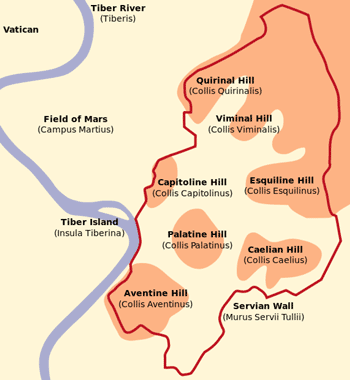
>Top 4. What about economic inequality in the Roman Empire?:
- The Roman Empire was not an exception on this matter.
- Why economic inequality happened.
- The impact which affected management of the community.
- Distribution of wealth attributes to the taxation system.
- People dislike any kind of taxes; the real rate should be verified.
- People feels irregular tax as more heavier.
- Taxation system should be as much as simple.
- Taxation system of the Roman Empire: revised by Augustus
- Roman citizens:
- No direct tax. (Conscription)
- 5% Tax for slave emancipation; 2% on sales of slaves
- 5% Inheritance tax
- No Roman citizens:
- >Top Conscription or 10% of Income (Tithe)
- Indirect tax to any citizens:
- 1.5-5% of custom duty.
(lower rate was applied as a subsidy for bad economy or natural disaster)
- Provided, 25% for luxury items from Orient
- 1% of Sales tax
- CSR: Donation to public architecture instead of naming right:
(Appian Way, Flaminian Way, Theater of Pompey, Julius Hall, Claudius Water, Flavius Arena, etc.)
- Maintenance for the architecture; Rock is a friend, but water is enemy.
- Roman taxes are supplied to be lower than modern nations.
- No local taxes.
- Medical and education were self support.
4. 富の格差について:
- ローマ帝国のこの問題の例外ではない。
- なぜ富の不平等が起こったのか
- 共同体運営に及ぼした影響
- 富の分配とは所詮税制の問題
- 人々は税が嫌い。個々の税率を検証する必要あり。
- 臨時の税金は重く感じる
- 税制は単純明快であるべき。
- ローマ帝国の税制 (アウグストゥス):
- ローマ市民:
- 直接税なし(徴兵制あり)
- 5% 奴隷解放税
- 5% 相続税
- 非ローマ市民:
- 徴兵制または収入の10%; 10分の1税 (Tithe)
- 間接税:
- 1.5-5%の関税
- 但し25% オリエントからの贅沢品
- 1% 売上税
- 社会貢献:
- 公共的な土木建物は寄付。但し命名権を持つ
- 地方税なし
- 医療・教育は自助
>Top 5. Confrontation with Carthago:
- Punic Wars (Bella Punica):
- 264-242BC (23 years): First Punic War
- Battle field was mostly in Sicily island, but was largely a naval war.
- 260BC Carthage defeated Roman navy at the battle of Lipari Island.
- Within 2 months the Romans had a fleet of 100 warships.
- Romans knew that they could not defeat the Carthaginians in traditional ways; adding the corvus, an assault bridge.
- In 249 BC, the Battle of Tunis (Bagradas), ended in a Carthaginian victory. Rome lost 60,000 by seawreck during retreating.
- In 241 BC, Carthage signed a peace treaty; they evacuated Sicily and paid Rome a large war indemnity. Rome include Sicily, Sardegna, and Corsica as occupied province.
- 218-201BC (16 years): Second Punic War
- Battle field was Italy, Spain, Norther Africa
- In 219 BC Hannibal attacked Saguntum in Hispania, starting the second Punic War.
- Hannibal invaded Italy from the north and defeated the Romans in several battle, but never achieved the ultimate goal.
- In 218 BC, Hannibal attacked Italy by leading three dozen elephants through the Alps.
- He planned to turn the Italian allies against Rome and to starve the city. But the majority of the allies remained loyal to Rome.
- Hannibal's army was outrunning its supply lines.
- Hannival could receive the supply of food only twice; during staying in Italy 16 years, his army depended on local plunder.
- Rome attacked Hannibal's home base in Africa and stopped the flow of supplies.
- 202 BC: Hannibal quickly turned back but suffered defeat in the Battle of Zama.
- 149-146BC (3 years): Third Punic War
- >Top Carthago delenda est (Calthage must be destroyed):
- Battle field was Carthago
- In 149 Rome escalated demands, 300 children of the nobility as hostages, and the be demolished and rebuilt away from the coast deeper into Africa.
- Carthaginians were forced into a more active role in the defense of their city.
- They made catapult strings using women's hair, and were able to hold off the initial Roman attack.
- 146 BC: Second offensive by Scipio Aemilianus resulted in a three-year siege before he breached the walls, sacked the city and burned Carthage for 17 days. The remaining 50,00 Carthaginians were sold into slavery.
- Aftermath of the Punic wars:
- 80 years later: Caeser and Augustus: reconstructed Carthago as an important
trade center of Northern African products.
- Then, why the Romans destroyed Carthago completely in 146 BC, by scattering salt on the land lest no agriculture should be revived.
- Marcus Porcius Cato (Cato maior), ultra nationalist of Rome, purged Scipio Africanus Major.
5.宿敵カルタゴとの対決について:
- ポエニ戦争:
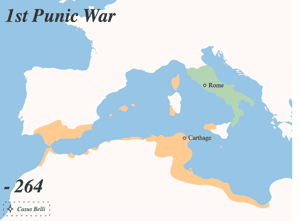
・247-183BC: Hannibal Barca
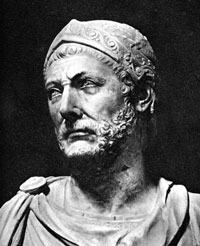
・236-183BC:
Publius Cornelius Scipio Africanus Major:
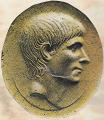
- Carthago delenda est (カルタゴは滅ぶべし)
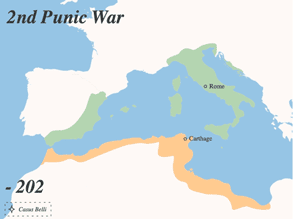
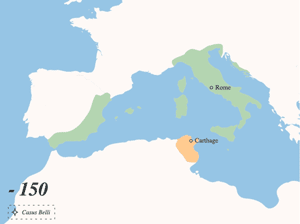
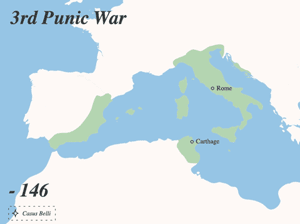
>Top 6. Common points between Ancient Rome and Current Japan:
- There typical several common points between the ancient Rome and current Japan.
- Both prefer to take a bath; they aren't satisfy to take a shower only. Also they wash their bodies outside the bathtub.
- Both prefer hot springs. Italy and Japan are located on volcanic zone, having lots of hot springs. They enjoyed hot springs in naked bodies, which began to be refrained by Christianity.
- Both prefer interior design or painting in their rooms. The houses of Romans and traditional Japan have much less furniture in the room, but having various pictures and stories are painted on the wall, floor, and even ceiling.
- Both prefer fish (including squid, octopus, and eel) than meat. When the Roman east meat, which is mostly pork or chicken than beef unlike Northern Europe
- Both have the ability of commercialization. There had been paved roads before the Roman Empire, but they recognized the more usefulness of the road network. (Omnes viae Romam ducunt.)
- Arch and vault (or iwan) structures were invented by Etruscan, but developed by Romans.
- Calendar was invented by Egyptian and Greek, but developed by Roman as daily useful one.
- Sculpture, philosophy, and literature were invented by Greek, but also developed by Romans.
- Latin had been official language until 18C, became mother language of Italian, French, Spanish, Portuguese, and Roumanian.
6. 古代ローマ人と現代日本人との共通点:
- 古代ローマと現代日本との共通点
- 風呂好き
- 温泉好き
- 部屋に内装画
- 魚料理好き
- 企業化精神。道路網・建設
>Top 7. What had been the Pax Romana?:
- Pax Romana:
Definition of Pax (Peace): Nobody wants war, but human history is the history of wars. Why?
- The aspect of peace may contain selfishness, or peace the best value for the have.
- Two stages of peace:
- Economic activities needs peace.
- Finish of conquering stages.; which is the case of the Roman Empires
- The Roman's policies sustained Pax Romana:
- Deployed 25-30 military corps along the national boundary.; each corps contained 6000 soldiers, and the total was 150-180K soldiers, which is smaller than the current European countries.
- In addition, around 300K auxiliary soldiers organized by volunteers from the provinces were deployed.
- When their services exceed 25 year, they are entitled to become Roman citizenship.
- Basic Roman policies:
- Maintenance of lower taxation, without irregular taxes.
- Misgoverned Governor-General could be prosecuted after the term in office.
- Around 10 collection points of custom taxes in the empire.
- Stable maintenance of money in nominal and real value of metal (gold, silver, bronze).
- >Top Via Romana: 'Omnes viae Romam ducunt'.
Maintenance of road network and its security.; the roads were constructed connected Rome, and used like free highways for military and commercial purpose.
- Bandit or pirates were executed at the Colosseum by fierce animals.
- Recruit able persons even from occupied provinces, notwithstanding tribes, color of skin, or religion.
- It is said that the Rome did not conquer other tribes, but made other tribes the Romans.
- Traditional controversy:
- Close or open policy of the empire; the former insisted the Rome should control provinces, while the latter insisted the Rome and provinces were common destiny.
- >Top Cicero and Brutas were the former, while Julius Caesar (and later Emperor Augustus) were the latter.
- Gaius Iulius Caesar (100-44BC)
- 47BC: Battle of Zela: 'Veni, Vidi, Vici'
- 49BC: alea iacta est!, when he crossed Rubicon River.
- 44BC: Et tu, Brute?
- Then, the Roman Empire became a universal empire; whose ideal was originated from Alexander the Great.
- Plutarch's 'Parallel Lives': Alexander the Great vs. Julius Saecer
7. パクス・ロマーナとは何であったのか:
- ローマ主要街道 (Via Romana)
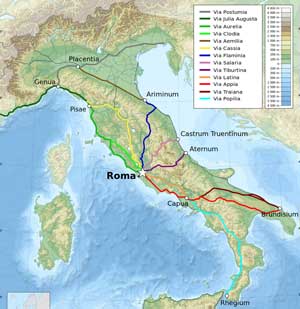
- ローマの伝統的論争:
- 鎖国路線 vs. 開国路線
- 属国は支配すべき vs. ローマと属国は運命共同体
- キケロ+ブルータス vs. シーザー
- アウグストゥスはシーザーの後継
- ローマ帝国は普遍帝国となる。
- この理想はアレキサンダー大王が創設
- プルターク'英雄伝'; アレクサンダー大王 vs. カエサル
>Top 8. What about the Roman Emperors?:
- The images of the Roman Emperors described by Hollywood movies were mostly made by Jewish or Christian directors.; The Roman Empire had been the enemy for them.
- Mass psychology tends to describe unusual scenes of the Roman emperors.
- The most unpopular emperors are Nero and Carigula.
- 330 years before Constantinus there had been six emperors who got passing mark during 130 years; from Augustinus and Nerva–Antonine dynasty.
- The remained 200 years were all bad emperors?
- In the middle ages, physiques were smaller than the ages governed by 'bad emperors.
- >Top
- Senatus Populus que Romanus" SPQR:
- Emperor had been a prime of citizens; (Princeps Senatus; Priceps Civitatis)
- Roman senate could resolve dismissal of the emperor.
8. ローマの皇帝たちについて:
- ローマ皇帝のイメージ

- 多くはユダヤ教・キリスト教の視点から描かれた
- コンスタンティヌス帝以前の330年間: アウグスティヌス〜五賢帝
- 中世はむしろローマ最盛期より体格が劣化。
- 皇帝は市民の中の第一人者:
- ローマ元老院によって免職もあり得る
>Top 9. What had been the Roman citizen or citizenship?:
- Citizen has the right to participate in the national government and has obligation of national defense.
- Greece and Rome contrast each other.
- Greek citizenship depends on blood; democratic regime and isolation policy.
- Greek society was composed of citizen, alien, and slave.
- Socrates had military experience but Aristotle who had neither citizenship nor military experience.
- Roman citizenship depends on one's resolution;
- Roman society was composed of different classes; senate, equites, citizen, people of provinces, freedman, and slave, but had mobility of the society.
- Roman society was not equitable society, but has mobility of the society.
- Typical governing class was composed of descendants of occupied areas, like Julius Caeser.
- Caeser admitted citizenship for medical or education specialist from occupied areas.
- Augustus gave citizenship after 25 years military services of soldiers from occupied areas.
- The Roman Empire had been an universal empire, different from an ethnic empire.
- The Rome had been polytheism.
9. 市民とは市民権とは何か:
- 市民権: 国政参加の権利と国防の義務
- ギリシア:
- 市民権は血族
- 市民 - 他国人 - 奴隷
- 平等体制、鎖国路線
- ソクラテスは市民、アリストテレスは非市民
- ローマ: 開国路線
- 市民権は志
- 階級社会+社会の流動性
- 元老院 - 騎士階級 - 市民 - 属州民 - 解放奴隷 - 奴隷
- 25年間の兵役後、市民権
- 被征服民からも人材登用
- シーザー依頼の伝統
- 普遍帝国 vs. 民族帝国
>Top 10. Fundamental difference between Polytheism and Monotheism:
- Difference of Polytheism and Monotheism:
- Difference is not only the number of Gods, but what kind of God people in various specific fields.
- Roman Gods:
- Iliad: Both side Gods supported each side in the War of Greece between
- Gods of Polytheism are not almighty; in praying God, they must add to pray for the unknown Gods.
- Troy.
- Roman Gods were supporters for human beings in various special areas.
- Roman Gods increase in number from 12 of Greece to about 300K.
- The Romans built various Concordia to celebrate various wars.
- The Romans deified Caesar or Augustus, or some other emperors.
- Viriplaca Goddess smoothing anger between married people; each spouse tells her or his grief and the other listen it patiently.
- Capitolino (one of 'Septem Montes Romae): corresponds to Acropolis of Greece.
- There were shrines of not only Roman Jupiter (Zeus), Juno (Hera), Minerva (Athene), but also Isis of Egypt, Mitra of Syria, Tanito of Carthage.
- After Christianizing, only Christian church has stood on this hill
- God of monotheism like Jewish, Christian, and Islam is almighty, make order or make punishment to human beings.
- Monotheism never admits the existence of other Gods.
10. 多神教と一神教との本質的な違いについて:
- 多神教と一神教の違い:
- 神の数ではなく、どのような神を求めるかによる。
- 多神教は各分野で人々をサポートする存在
- 一神教の神は、人々に命令し罰を下す存在
>Top 11. What about the Roman Law?:
- >Top Jewish Moses' Ten Commandments (Decalogue):
- Thou shalt have not other Gods before me.
- Thou shalt not make unto thee any graven image.
- Thus shalt not take the name of the Lord thy God in vain.
- Remember the Sabbath day, and keep it holy.
- Honour thy father and thy mother.
- Thou shalt not murder.
- Thou shalt not commit adultery.
- Thou shalt not steal.
- Thou shalt not bear false witness against thy neighbour.
- Thou shalt not covet neighbour's house, neighbour's wife, or anything else.
- The above 1-4 are applicable to Jewish only, while 5-10 applicable to anyone.
- For the Roman could not abide by:
- The above 1: sounds nonsense, because they were Polytheism.
- The above 2: was meaningless for Romans.
- The above 3: was usually uttered, 'Oh, Jupiter', or 'Oh, Hercules.'
- The above 4: they were free to do except to work on holidays.
- For the Christians:
- The above 2: there are many sculptures of Jesus, Maria, and other saints.
- The above 3: they frequently utter 'Oh, Jesus Christ', or 'Oh, my God.'
- The above 4: Sculpture of Saints (not Gods) are allowed. On the Sabbath day, Sunday, they enjoy relaxation like sports, etc.
- Christians abide by the above 1. only.
- Moses' Ten Commandments were made by God, and are irrevocable.
- The Roman Laws were made by human beings, and are revocable.
- In Rome, the laws adjust to the behavior of humans, while in the Moses' ones humans adjust to the laws given by God.
- 451BC, 'Lex Dudecim Tabularum' was stipulated, but was revised many times in the following 200 years.
- >Top 529-534: Corpus Juris Civilis (Body of Civil Law)
- Correct actions:
- Jewishs depend on religion, Greeks on philosophy, and Romans on law.
11. ローマ法について:
- ユダヤのモーゼの十戒:
- 他に神はなし
- 偶像崇拝禁止
- 神の名をみだりに唱えない
- 安息日は祈りのみ
- 父母を敬え
- 人を殺すな
- 姦淫するな
- 盗むな
- 偽証するな
- 家を侵すな
- ローマ人は 1-4無視
- キリスト教徒は2-4無視
- 十戒は神が与えたので変更不可
- ローマ法大全は人が作成したので変更可能
>Top 12. Urban Planning in Rome:
- Greeks considered the city was completed when the port for trade was constructed.
- >Top Romans considered the city was completed in the arrangement of Roman style urbanization, such as paved street, water and sewage, having central 'Forum' surrounded by public buildings such as delubrum (holy places), senatus, and basilica, together with amphitheater, colosseum, stadium, and public bathhouse; the city was completely surrounded by rampartwall.
- Such Forum is unique rectangular space surrounded by corridors or colonade with offices, shops, and private schools. Basillica was used as courthouse, meeting places.
- Romans constructed such Roman style cities in occupied areas, connecting paved flat road throughout the Empire.
- This tradition was succeeded in the design of city in modern Europe.
- Before the Roman Empire, there had been no civilization which recognized the importance of social capital. Such design was pressed by the Empire, and also acceptable to the conquered people.
12. ローマ人の都市計画:
- ギリシアの都市との違い
- ローマの都市設計:
- 都心部にフォルム(Forum): 回廊方式の長方形の広場神殿
- その周囲に神殿、公共施設、オフィス、店舗あり。
- 道路網、上下水道設備、半円形劇場、円形闘技場、スタジアム
- 征服者のローマ人の押しつけであるばかりか、被征服民も受け入れた。
- 欧州の都市のモデル
>Top 13. What about truth, goodness, and beauty?:
- Most of the sculptures are made in nude. Did the Romans have persistency in nude?
- The answer is that the Romans believed nothing is more beautiful than nude.
- In Athletics, or in public bathhouse, nude was commonly observed.
- A sense of shame about nude was made by Christianity.
- Alcibiades (c450-404BC); a handsome politician, serviceman, and demagogue of Athens; a disciple of Socrates (c470-399BC). Later, he exiled to Sparta, then to Persia due to love affairs with a princess in Sparta, and once returned to Athens, but finally was assassinated.
- Socrates: nosce te ipsum (Know thyself)
- Beauty leads into art, and truth into philosophy.
13. 真・善・美について:
- アルギビアデス: プラトンの弟子。アテネの政治家・軍人・デマゴーグ
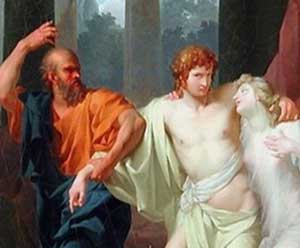
>Top 14. What about 'bread and circus' in the Rome?:
- Decimus Juvenalis (60-130), a famous critical satirist (skit) in the Roman Empire coined 'Panem et Circenses' (Bread and Circus); actually competition and show.
- History of bread and circus policy:
- >Top Lex frumentaria (Grain law): distribution of wheat to citizens (men only) in Rome at lower prices or sometimes free; a kind of minimum guarantee.
- Caesar revised this law; halved the upper limit of free distribution of the wheat from 320K to 150K
- The volume of free distribution of wheat was not enough, but contributed to prevent mass starvation in the Empire.; about 32.5 Kg wheat grain per day.
- Exhibitions in colosseum were regarded as an opportunity of the Emperor to appear in front of citizens in Rome to estimate his popularity.
- Typical life style of citizens in Rome: though not worker bee, they worked.
- 05:00 wake-up
- 06:00 start of works; receiving visitors (client) at home.
- 08-09:00: start of official works at Forum (Senate or court meeting, etc.)
- 12:00 or 13:00: end of official works
- 13:00-14:00: lunch at Taverna
- 14:00-17:00: open of public bathhouse
- 17:00- : open of brothel
- around 18:30-19:00: dinner at home
14. パンとサーカスとは何であったのか:
- 60-130 ユヴェリナス, 風刺詩人の表現
- パン政策は、'小麦法'に由来。ローマ市民に対する福祉施策。
- シーザー: 無料配布を32万から15万に削減。
- 典型的な1日 (ローマ市民):
- 1日を二分し、仕事と余暇
>Top 15. What about freedom in the Rome?:
- Most of the attractive heros appeared in 'Republic Rome' (Res Publica Romana; 509-27BC) age, not in Roman Empire (Imperium Romanum; 27BC - 1453).
- Such heros as Scipio Africanus (236-184BC), Lucius Sulla (138-78BC), Lucius Lucullus (118-56BC), Gnaeus Pompeius (106-48BC), Julius Caesar (100-40BC) were in Republic Rome.
- Freedom was assumed to around 600 'Senato della Repubblica'.
- The age of Republic Rome was offensive, but that of Roman Empire adopted defensive policy.
- Cornelius Tacitus (55-120); historian who was from province, later became Senatus, then consul; wrote grieving recovery of the spirit of Republic Rome.
- Niccolo Machiavelli (1469-1527) pointed that the requisite factors for the leader, were ability, fortune, and adequateness for the age.
15. 自由について:
- 共和制
- 元首制 (Principatus)
- 帝制
>Top 16. What about slavery in the Rome?:
- Slavery had not been considered 'mistake' until 200 years ago.
- Jewish and Christians never insisted abolition of slavery; they considered slaves of heathen didn't matter.
- In ancient Greece and Rome, slavery system was widely proliferated.
- Abolition of slavery was proclaimed since Enlightenment age 18C. Actually most of slavery systems were abolished in 18C.
- Supply of slaves in Greece and Rome, both were Polytheism:
- No payment of loans; later prohibited in Greece and Rome by law.
- Defeat of war
- Children of poor parents or of disables or foundling who were sold to slave trader. Abducted by bandits or pirates
- The case of above 2:
- 'Winner of rights'; in the ancient wars, rejection of surrender meant all properties and people (including women and children) belonged to winner of the war.
- After the war at Cannae in the Second Punic War, 8,000 Roman soldiers were sold to Greece as slaves.
- After the defeat of Calthago, 50,000 Calthago people brought to Rome as slaves.
- In ancient society, it was usual that Athenian slaves in Sparta, Arabic slaves in Jewish homes.
- Slaves could not determine their destiny by themselves.
- >Top In Greece, status of slaves were lifetime, but in Rome there could be Freedman (L. Libertus). Some exceptional freedmen could acquire citizenship in Rome.
- >Top 73BC; Spartacus, gladiator in Republic Rome, from Tracia, leader organized rebellion of 100K soldiers in 'Tertium Bellum Servile.' (Rebellion of Spartacus)
- Karl Marx commented that Spartacus was a representative of ancient Proletariat.
- Decrease of supply of slaves:
- Since Pax Romana, there were no major wars except Jewish war (ha-Mered Ha Gadol , 66-74), and Conquista della Dacia (101-102, 105-106)
16. 奴隷について:
- 奴隷の供給源:
- 借金返済不能
- 戦争の敗者
- 貧困・障害・拉致等で奴隷商人へ売却
- 上記2の場合:
- 戦争における'勝者の権利'
- 財産・捕虜の奴隷化(女子供も)
- ポエニ戦争:
- カンネの戦い: 6千ローマ兵
- ザマの戦い: 5万のカルタゴ
- 解放奴隷 (Freedman, Libertus)
- 剣闘士スパルタクスの反乱
- 奴隷供給の減少:
- 防衛が主で戦闘が減少
- 奴隷の待遇改善の動き: 奴隷同士の結婚
>Top 17. Is it possible to revive 'If' by all means?:
- In studying history, academic research tends to split hairs, or making a fuss over details. Their research would stipulate 'if' strictly prohibited' policy in history.
- 'If prohibited' policy diminished the interest of history, on the other hand totally different genre of 'historical novel' is getting popular.
- Pericles (c495-429BC), influential politician, orator, and general in Golden Athens.; 'Age of Pericles' educational & cultural center in ancient Greece.
- Pericles's Grand Strategy (in Peloponnesian War):
aiming the exhaustion of the enemy and the preservation of the status quo. Athens as the strongest party did not have to beat Sparta in military terms and chose to foil the Spartan plan for victory.
- Julius Caesar: 'Alea jacta est' (The die is cast; a point of no return), or crossing the Rubicon at the civil war against Pompey and Optimates. He released the captured officer of Pompey's army, which was evaluated by Cicero of Pompey's faction.
- Alexander the Great (356-323BC), was asked what things would be put in the treasure box got at the battle with Dareios III (558-486BC); he replied it should be the book of 'Iliad'. What a romantic answer it is!
- These episode could be not an academic object; but it sounds very impressive and unforgettable ones.
- Description of history has two patterns: either only accumulation of facts or evidence verified by academic historians, or total fiction created or exaggerated by novel writers.
- The author would pursue the third category of description, filled with lots of episode, or quotations from plausible hearsay stories by then historians or witnesses, which might arouse the readers' imagination, making to revive vivid body from sculptured marble stones.
17. イフの復権は是か非か:
- Age of Pericles:

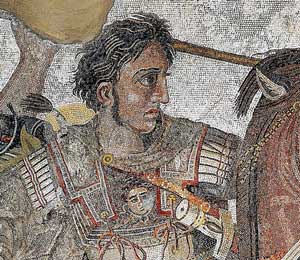
>Top 18. About women in the Roman Empire:
- The status of women in Rome was much established than that of Greece.
- In Athene, there were higher-class 'hetaira' (courtesan) and lower-class 'pornai' ; only the former could participate to the party was allowed.
- But in Rome, 'matrona' (=matron, married woman) who could attend the party.
- During elementary and middle education boys and girls could equally attend, learnt Greek, then lingua franca.
- Matrona were not only house-wives, but decided tutor, learning athletics, witness of coming-of-age celebration, and marriage partner.
- The major reason of established status of women attributes economic independence; proper right was inherited to evenly daughters.
- Another episode:
- Procurement of war expenses: Brutas vs. Antonius & Octavianus
- Caesar faction need to collect funding in mainland Italy. They tried to impose to tax to women in Rome; but 1,400 matrona objected brought to lawsuit. Any men lawyers hesitated to object Antonius & Octavianus, but a daughter of Hortensius. The conclusion was victory of matrona, because of 'there is no obligation unless having right.' Women were not allowed to involve any public services, except their voluntary services.
- the crime of adultery: married women were expelled to an isolated island being forfeited one third of of their property.
- But they watered down this law; proustites were exempted in this law. They escaped guilty from this law insisting that they were proustites.
- Such as immorality or adultery should be privately solved, not the matter publicly intervened.
- After propagation of Christianity, such generosity disappeared; women in Christian society were required to behave cleanly and correctly.
18. 女について:
- ローマ帝国における女性の地位:
- アテネでは宴への出席はヘタイラのみ
- ローマでは、既婚婦人マトローナの同席が認められた。
- 教育も初中等は男女平等。
- マトローナの家庭内での役割:
- 子供の養育
- 家庭教師の選定
- 体育など習い事
- 成人式の証人依頼
- 結婚相手の選定
- 理由は女にも財産権が認められ、経済的に自立していた。
- <別のエピソード>:
- カエサルの仇討ち戦費調達。カエサル派は、イタリアでの増税に、ローマのマトローナから課税を提案。
- マトローナ側の大反対。1400人のマトローナによる訴訟。結論は勝訴。
- 理由は、権利なき所に義務無し。
- ユリウス姦通罪法:
- 不倫に対しては、財産1/3没収の上、離島へ追放とする。但し、娼婦を除く。
- その後、姦通罪になりそうになるとそれが職業と主張することで、この法律を骨抜きにした。
- キリスト教普及以降は、女たちもまた清く正しい行いが求められた。
>Top 19. What about savage tribes?:
- Did the Roman Empire collapsed by the invasion of savage tribes in the end stage of the Empire?
- As the direct cause of the collapse was true, but such invasions frequently occurred for much longer period. The invasion occurred particularly:
- In the case of starvation
- As the refugee when the savage tribes were attached by stronger tribes.
- Invasion to plunder rich people in the Empire.
- 390BC: Celtic tribe (Gallic) invaded, occupied almost all Rome city, except on hill. (Their original land were northern part of Italy (Milan & Turin) and souther France.
- Middle of 1C: Gallic War by Julius Caesar, shifting the defense line from the Alps to Rhine River and Danube River. (River is easier as the defense line than mountain)
- 2C: other salvage tribes (about 100K) from Germany and Denmark invaded Rome.
- As defense bases, such cities as Cologne, Bonn, Mainz, Strasbourg, Augsburg, Vienna, Budapest, and Belgrade were built in a row.
- Strategy to prevent invasion:
- Defense first policy: building strong walls around the city.
- Offense is the best defense policy: continuing offense priority policy.
- 'Divide et impera' policy: conciliate with friendly tribes.
- 5C: Great Migration (Volkerwanderung) started.
- Why the Eastern Roman Empire could prevented such invasions, but the Western couldn't.
19. 蛮族について:
- ローマ帝国の滅亡は、帝国末期の蛮族の侵入によってなのか?
- 直接の滅亡の原因としては事実。しかし侵入はずっと前から発生していた。侵入が発生したのは
- 飢饉が発生した時
- より勇猛な部族に襲撃され難民として
- 帝国内の裕福な人々への略奪
- 390BC: ケルト族(北伊・南仏)の来襲によりローマのほとんどが占拠された。
- 1C中: シーザーによるガリア戦記。ライン河とドナウ河を防衛線に
- 2C: 他の蛮族10万(独・デンマーク)が南下
- 帝国の北の防衛基地として、ケルン、ボン、マインツ、ストラスブール、アウグスブルグ、ウィーン、ブダペスト、ベオグラードを数珠つなぎに建設。
- 侵入防御戦略:
- 防衛第一: 強固な城壁の建設
- 攻撃は最大の防御: 攻勢路線の継続
- 分割して統治: 属州民を分割・懐柔
- 5C: 民族大移動の開始
- 東ローマ帝国は侵入を防げたのに、なぜ西ローマ帝国はできなかったのか。
>Top 20. Why the Roman Empire had fallen?:
- There is an appropriate answer from Edward Gibbon (1737-94), who wrote 'The history of the decline and fall of the Roman Empire.'
- The fall of the Roman Empire was natural and inevitable result of the great civilization. Its great architectures were collapsed by those own weight.
- It is more important to ask why the Empire could had continued so long time rather than to ask why it collapsed.
- Author's comment:
- The roman architectures were mostly built from the period of foundation to collapse of the republic system; were mostly maintained from the Emperor system.
- The Gibbon's analysis started from the period of Emperor system.
- Gibbon lived in the age of Enlightenment about 200 years ago, believing European future backed by experiences of four millenniums. He believed the Pax Britannica which succeeded Pax Romana.
- The author is in the process of writing of the 15 volumes of stories of the Romans, where she don't write the story from the perspective of the modern age.
- There are as many analyses of fall of the Roman Empire as many historians.
- The major cause was Christianity tried to relive the decadent civilization, but it was too late; as the Western Roman Empire was more decadent than the Eastern.
- I couldn't agree this answer; because the age of most decadent Roman society that then scholars resented could continued.
- Vices of Roman society after 2C were rather decreasing.
- The author imaginably concludes that the cause could be the loss of ambition and vitality of the Roman people.
- The the next question would be why and from when they lost their ambition and vitality.
20. なぜローマは滅亡したのか:
- これには歴史家エドワード・ギボンの"ローマ帝国衰亡史"がある。
- それに依れば、ローマの滅亡は不可避であり、ローマの大建築はそれ自身の重量によって崩壊した。
- なぜ崩壊したかより、なぜあれほど長期に亘って存続できたのかを問うべき
- 著者のコメント:
- ローマの建築は建国から共和制崩壊まで建造の時代、帝政以降が維持の時代。
- ギボンは200年前の啓蒙主義の時代の分析。西欧の歴史は、4000年の経験の上に立っている。パクス・ブリタニカはパクス・ロマーナの後継者。
- 著者は、現在"ローマ人の物語15巻"執筆中だが、現代の視点からは描いていない。
- ローマ帝国の滅亡の分析は歴史家の数だけある。
- 主な原因は、堕落するローマをキリスト教が救おうとしたが時既に遅しだった。西ローマ帝国の方が堕落の度合いが強かった。
- この回答には納得できない。
- ローマの悪徳は2C以降むしろ減少
- 著者意見: ローマの覇気と気力が失われたからではないか。
- では、なぜいつからローマ人はその覇気と気力を失ったのか。
Comment
- The author reevaluates appeal points of the Roman Empire; but it is surely an ancient empire:
- Despotic state of Senates (600) and Citizens of Rome (male only; 1M).
- Slavery system with constant suppy of slaves, having some exceptional mobility (Freedman; L. Libertus; ).
- Populism policy to Citizens (bread & circus), which exceptionally opened to the loyal tribes of occupied provinces.
- Intentive public investiment for social capital (roads and cirty), but no medical and educational systems.
- Lower taxation, but though priviledged tax collectors.
- Occupied rich and affluent areas of Mediterranean areas, overwhelming surrounding tribes.
- Population:
60M in the Empire, having a million size city like Rome. Population growth is 0.1% (Easter Empire 007%) Life expectancy about 25, but around 40 after 5 years old. Death by plague was serious and decisive. Polylific society to maintain population; 6-9 children per woman. No contraception. Female infanticide and parricidium (?)
- Low economic growth: lower production rate, mostly due to short life expectancy.
- State-regulated prostitution.
- Early marriage: male 20s, female teenagers. Breast-feed children.
- 著者はローマ帝国の特徴を再評価しているが、それは厳然とした古代帝国である。
- 元老院議員(600)とローマ市民 (男性100万)の独裁国家
- 奴隷制; 奴隷供給の仕組み。但し、例外的流動性(解放奴隷)
- 市民へのポピュリズム(パンとサーカス)
- 公共投資 (道路・都市)重視;医療・教育なし
- 低税率; 但し、徴税請負人あり
- 地中海の肥沃の地を支配。周辺種族を圧倒
- 人口: 帝国は600万。ローマなど100万都市。人口成長率0.1% (東方は0.07%)。平均寿命約25才、5才以降は40才。疫病による死亡深刻。多産社会 (6-9人);避妊なし。女子嬰児殺し?
- 低成長経済; 短命による生産率低下
- 公娼制度
- 早婚。男20代、女10代後半。母乳哺育。
Imperium Romanum |
Cat: HIS |
|
Nanami Shiono (塩野七生) |
16020u/18227r |
Résume |
Remarks |
>Top 0. Preface:
|
0. 序文:
|
>Top 1. Was the Rome conquered culturally by the Greece?:
|
1. ローマは文化的にはギリシアに征服されたのか?:
|
>Top 2. What about the evils of conduct of the Romans?:
|
2. ローマ人の諸悪なるものについて:
|
>Top 3. The relationship of city and country areas in the Roman Empire:
|
3. 都市と地方の関係について:
|
>Top 4. What about economic inequality in the Roman Empire?:
|
4. 富の格差について:
|
>Top 5. Confrontation with Carthago:
|
5.宿敵カルタゴとの対決について:
・247-183BC: Hannibal Barca
・236-183BC:
|
|
 |
 |
 |
>Top 6. Common points between Ancient Rome and Current Japan:
|
6. 古代ローマ人と現代日本人との共通点:
|
>Top 7. What had been the Pax Romana?:
|
7. パクス・ロマーナとは何であったのか:
|
>Top 8. What about the Roman Emperors?:
|
8. ローマの皇帝たちについて:
|
>Top 9. What had been the Roman citizen or citizenship?:
|
9. 市民とは市民権とは何か:
|
>Top 10. Fundamental difference between Polytheism and Monotheism:
|
10. 多神教と一神教との本質的な違いについて:
|
>Top 11. What about the Roman Law?:
|
11. ローマ法について:
|
>Top 12. Urban Planning in Rome:
|
12. ローマ人の都市計画:
|
>Top 13. What about truth, goodness, and beauty?:
|
13. 真・善・美について:
|
>Top 14. What about 'bread and circus' in the Rome?:
|
14. パンとサーカスとは何であったのか:
|
>Top 15. What about freedom in the Rome?:
|
15. 自由について:
|
>Top 16. What about slavery in the Rome?:
|
16. 奴隷について:
|
>Top 17. Is it possible to revive 'If' by all means?:
|
17. イフの復権は是か非か:
|
>Top 18. About women in the Roman Empire:
|
18. 女について:
|
>Top 19. What about savage tribes?:
|
19. 蛮族について:
|
>Top 20. Why the Roman Empire had fallen?:
|
20. なぜローマは滅亡したのか:
|
Comment |
|
|